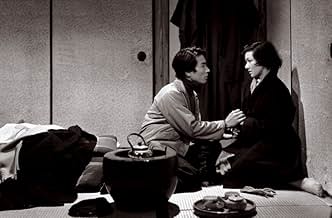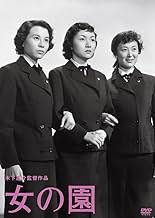A student at a woman's university takes a controversial action against the school's old-fashioned doctrines.A student at a woman's university takes a controversial action against the school's old-fashioned doctrines.A student at a woman's university takes a controversial action against the school's old-fashioned doctrines.
- Awards
- 8 wins & 1 nomination
- Director
- Writers
- All cast & crew
- Production, box office & more at IMDbPro
Storyline
Did you know
- TriviaHideyo Amamoto's film debut.
- Quotes
Tomiko Takioka: I have the right to reject what I dislike. You made it hard for me to go home. What did I do wrong? I'm no longer a child!
- ConnectionsFeatured in Century of Cinema: Nihon eiga no hyaku nen (1995)
Featured review
The Garden of Women is a social commentary on the changing status of women in Japan during the days after World War II. The setting is a women's boarding college in Kyoto where rich families send their daughters. The goal of the school, however, is not so much to provide an education as it is to produce potential brides. In order to produce these results (and to protect the school's reputation) the administrators bury the students with rules and regulations, while also prying into every aspect of their private lives. The end result is that the place feels more like a prison to the students than a school. A number of students decide to fight for their rights, which of course leads to conflict with the school's administrators.
It's hard to complain about a movie with such lofty goals. I imagine there really were schools like this in Japan at the time, and efforts by young women to be seen as equals is of course laudable. Unfortunately, propaganda and social commentary aren't enough to make a good movie, and the end result here is not overly interesting. The storyline is never particularly compelling, the tone is rather strident and the movie is overlong. Even the great Hideko Takamine cannot save it, as she is given little to do other than look sad and break down crying (which she does a lot.) Overall, it might have some historical value to some people, but it is probably too histrionic and dated for most viewers today.
It's hard to complain about a movie with such lofty goals. I imagine there really were schools like this in Japan at the time, and efforts by young women to be seen as equals is of course laudable. Unfortunately, propaganda and social commentary aren't enough to make a good movie, and the end result here is not overly interesting. The storyline is never particularly compelling, the tone is rather strident and the movie is overlong. Even the great Hideko Takamine cannot save it, as she is given little to do other than look sad and break down crying (which she does a lot.) Overall, it might have some historical value to some people, but it is probably too histrionic and dated for most viewers today.
Details
- Release date
- Country of origin
- Language
- Also known as
- Devojački bunt
- Production company
- See more company credits at IMDbPro
- Runtime2 hours 21 minutes
- Color
- Sound mix
- Aspect ratio
- 1.37 : 1
Contribute to this page
Suggest an edit or add missing content

































